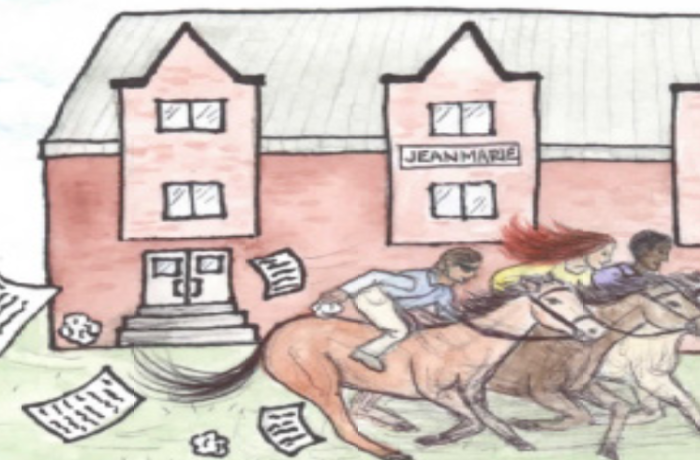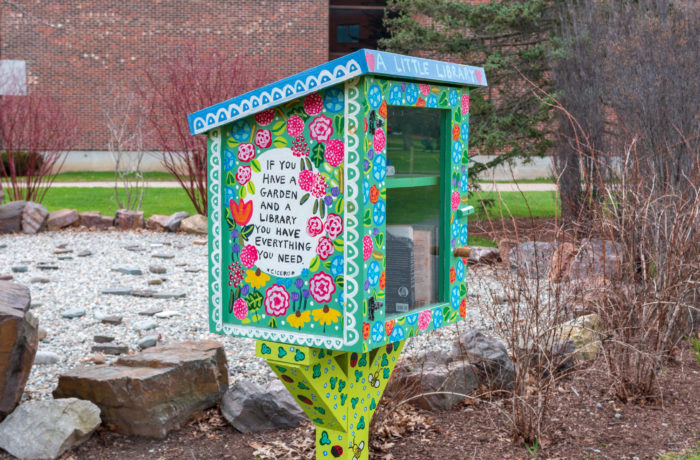 A grandson of the famous Indian peace-maker and activist Mohandas ‘Mahatma’ Gandhi, visited St. Michael’s on March 30, to share a message of nonviolence, methods of peacemaking, and the “legacy of love” left by his late grandfather. Arun Gandhi, now 82, lived in India for two years with his grandfather when he was a teenager because his parents were concerned about his anger and reactions to discrimination in South Africa where they lived.
A grandson of the famous Indian peace-maker and activist Mohandas ‘Mahatma’ Gandhi, visited St. Michael’s on March 30, to share a message of nonviolence, methods of peacemaking, and the “legacy of love” left by his late grandfather. Arun Gandhi, now 82, lived in India for two years with his grandfather when he was a teenager because his parents were concerned about his anger and reactions to discrimination in South Africa where they lived.
Traveling from his current home in Rochester, NY, Gandhi wore a tweed suit jacket and humble demeanor as he spoke to a packed room in McCarthy Arts Center Recital Hall. His soft voice requires the listener to really focus on his words, making his message that much more intentional.
He sat down with The Defender to discuss anger, nonviolence and inner peace at Penny Cluse Cafe in downtown Burlington the following day. Over his biscuits and gravy, Gandhi spoke of his life experience, philosophy, and why he thinks his message is relevant to the St. Michael’s community.
Q: What exactly is the practice of nonviolence?
A: Nonviolence to me is a means of personal transformation. It gives me an opportunity to look at my own weaknesses and transform those weaknesses into strengths, and then progress upwards from there.
Q: Are peace and nonviolence synonymous?
A: Yes but only if we understand what peace is. Unfortunately in modern times we think of peace only in terms of absence of war, but peace actually means when we can live in harmony with each other and nature. Nonviolence is the way we can create the type of atmosphere in which peace can prevail.
Q: How has your background as a grandson of Mohandas Gandhi and a native of South Africa influenced your understanding of nonviolence as a method of achieving peace?
A: I think it influenced me very positively because I don’t think I would understand this philosophy if I hadn’t been so closely associated with my grandfather. My parents fully committed to carrying on his work, so I grew up in that type of an atmosphere. If I had only spent those two years with my grandfather it maybe wouldn’t have made such a significant impact, but because my parents helped build on that foundation it made a very big difference.
Q: What is one lesson that your grandfather and experience with nonviolence has taught you?
A: I think one of the most important lessons is anger management. Anger causes a lot of the violence that we experience in life and if we learn how to use that powerful emotion intelligently we would be able to reduce violence very substantially.
Q: How do you think the idea and practice of nonviolence can be put to action by the people you have met and spoken with here at St. Michael’s?
A: I hope that you all can recognize nonviolence as a means of personal transformation. To understand that although it is important to get academic knowledge, it is also important to make the effort to raise ourselves upwards, to a higher standard by transforming our weaknesses into strengths. That leads to compassion, understanding, respect and to helping others who are less fortunate than us. It leads us towards a world of harmony.
Q: Do you feel the message of your grandfather is still adhered to in modern India?
A: Well it’s not there on the official level, in terms of the government. They abandoned his philosophy even before independence. But at the grassroots level the people still admire him and are influenced by his legacy. What surprises me is even the younger generation, who were born after his death, had never seen or met him but only know him from his writings, even they are so influenced by his teachings. They have in some cases dedicated their lives to it. In the Gandhi Legacy Tour I lead to India we visit many organizations started by young people who had never seen him yet are inspired by him. So it is still alive at the grassroots level, just not on the official level.
Q: Overall, do you think a future where nonviolence is the norm is truly achievable in this lifetime?
A: I don’t know whether it’s achievable or not, I wouldn’t speculate on that. My goal is to plant the seed. Ultimately, it is up to the people to nurture them or destroy them. I’m not fixated on the results; they take care of themselves. I must do what I have to do and if people take something worthwhile from my message, then it is for them to decide to act on it.


